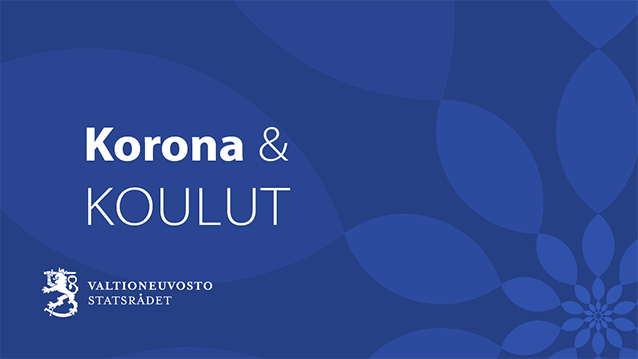New safety recommendations during COVID-19 for early childhood education and care, educational institutions and higher education institutions highlight local measures

The Ministry of Education and Culture and the Finnish Institute for Health and Welfare have issued new health security recommendations for early childhood education and care, schools, educational institutions and higher education institutions, taking into account the amendments to the Communicable Diseases Act and the transition to local and regional measures when lifting the restrictions. The recommendations have been updated to correspond to other recommendations and Government guidelines related to the coronavirus epidemic currently in effect.
The purpose of the recommendations is to support the organisation of early childhood education and care and education and training safely and to give guidance on the safe use of spaces during the COVID-19 epidemic. By complying with the recommendations, infections can be prevented and the number of people exposed to the virus can be reduced. If regional clusters of infection emerge, they will primarily be managed through local and regional measures in line with the Communicable Diseases Act. The new recommendations replace the corresponding recommendations issued in August.
Recommendations on the use of masks may vary regionally
Based on monitoring by the Finnish Institute for Health and Welfare, the risk of infection in early childhood education and care, in schools and in educational institutions has been low, and there is no need to issue general national recommendations on the use of masks in the education sector.
Based on their risk assessment, the competent authorities in the regions and local areas may issue supplementary or more limited recommendations in their area or locally depending on the epidemiological situation. Education providers are responsible for the safety of the learning environment and can issue their own recommendations on the use of masks in teaching and examination facilities. This means that recommendations on the use of masks in educational institutions, schools and early childhood education and care may vary regionally and between educational institutions.
The temporary provisions in the Communicable Diseases Act on measures to prevent the spread of the COVID-19 epidemic will remain in force until 31 December 2021. Under the Communicable Diseases Act, more intensive cleaning of premises and surfaces must continue and opportunities for everyone to clean their hands must be ensured, for example.
The earlier requirement the Communicable Diseases Act of two metres of distancing between people has been revoked. However, it is still advisable to make it possible for everyone to assemble as widely apart as possible. Sufficient distancing between people and avoiding close contacts prevent infections. The national recommendation to keep teaching groups separate can be lifted. The earlier national recommendation to keep a safe distance of at least two metres can also be lifted.
Procedures and practices to follow powers under the Communicable Diseases Act
In line with the Government Resolution of 9 September 2021, the restrictions and recommendations that were based on a system of classifying regions into different phases (baseline, acceleration phase and community transmission phase) will be discontinued once sufficient vaccination coverage has been achieved. Restrictions in place at the regional level can be gradually lifted even earlier if the epidemiological situation makes it possible. The procedures and practices in early childhood education and care, schools, educational institutions and higher education institutions are based on the acts regulating their activities and primarily on the powers laid down in the Communicable Diseases Act.
To prevent the spread of possible infections, it is important that everyone follows a practice where people who have symptoms or illnesses do not participate in early childhood education and care, teaching and other activities organised in the premises of educational institutions.
- Recommendations by the Finnish Institute for Health and Welfare and the Ministry of Education and Culture for providers of education and early childhood education and care during the COVID-19 epidemic (PDF)
- Recommendations of the Finnish Institute for Health and Welfare and the Ministry of Education and Culture to universities, universities of applied sciences and providers of general upper secondary education, vocational education and training, liberal adult education and basic education for adults during the coronavirus epidemic (PDF)
Inquiries:
Eeva-Riitta Pirhonen, Director General, tel. +358 295 330 258 (early childhood education and care, primary and lower secondary education and liberal adult education) Heli Nederström, Senior Ministerial Adviser, tel. +358 295 330 122 (early childhood education and care, primary and lower secondary education and liberal adult education, available as of 13 October.) Sami Aalto, Senior Ministerial Adviser, tel. +358 295 330 082 (general upper secondary education and vocational education and training) Laura Hansén, Senior Ministerial Adviser, tel.+358 295 330 098 (higher education institutions)

